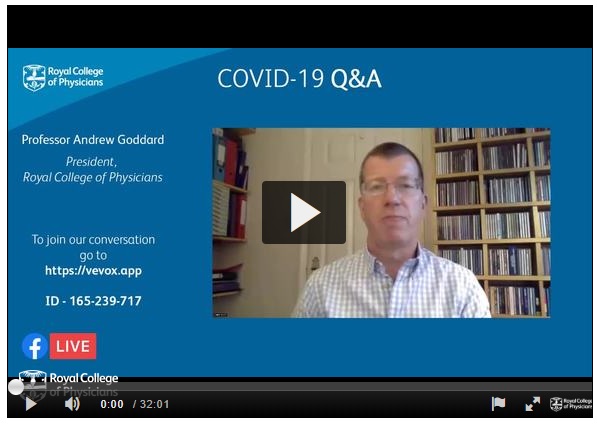Royal College of Physicians give the latest COVID updates
Prof Andrew Goddard addressed the UK's physicians with an update on the latest emergent evidence and policy in the UK.
Busy clinicians and interested members of the public can read summary points below. The full webinar lasts 30 minutes and is available through the link at the bottom of this page.
The key metric of relevance to physicians is admissions - this is the number which needs to begin to fall to help support management of the pandemic
The peak of the COVID pandemic is expected to be this week in London and next week in the rest of the UK
The major concern for RCP has been that 22% of members have responded to a recent survey that they had inadequate PPE, this has been fed back to NHS England and the situation seems to be improving
The success of PPE is reliant on thorough and meticulous 'donning and doffing' - some trusts are using a buddy system to monitor this process which can reportedly help
Only 31% of RCP member respondents were able to access testing for COVID when required and this is a major concern
The survey suggested an 18% absence from work rate amongst physician member respondents
Levels of distress amongst nurses are incredibly high currently due to their close contact with patients and nursing team members need support at this time
Hospitals with old "VIE" oxygen delivery systems are struggling with supply and hospital managers should be aware that update work may be required to ensure oxygen delivery
There is a current trial ongoing at UCH into effectiveness of CPAP supporting COVID-19 patients
Proning of patients appears to be an important part of care - observations on the ground are that it can result in improvements and these seem to last around 4 hours
Every effort should be made to include patients in trials
Recent experience suggests that it is no longer recommended to run patients in a negative fluid balance, their insensible losses are high and renal failure is an important reason for admission to ITU
Ethical guidance has been released which aims to help physicians in difficult scenarios
There is current ongoing discussion about whether CPR is an aerosol generating procedure and more guidance will be released on this. The success rate of CPR in COVID-19 patients has been found to be very low bringing into question its benefit in this scenario.
All cause mortality is coming into focus as there have been massive dips noted in the numbers of patients presenting with MI, stroke, retinal detachment and other serious conditions
The RECOVERY trial is looking to assess the role of steriods further as current evidence is conflicting
The respiratory manifestations seen in COVID-19 appear to be a unique clinical entity as they are not behaving as 'typical' ARDS nor 'typical' viral pneumonia
Microthrombi are increasingly being recognised as part of the COVID-19 clinical picture however there is not enough evidence to make recommendations on anticoagulation in these patients
There is no evidence for use of hydroxychloroquine as a prophylactic in healthcare professionals
COVID-19 seems to result in hypoxic respiratory failure without hypercapnia
The impact of antivirals and antimalarials is not known at present
RAAS inhibitors should be continued as there is no evidence at present of any causal link between these drugs and increased mortality
Hypertension, obesity and diabetes are highly associated with increased mortality
Some patients are presenting with meningo-encephalitis and a high index of suspicion should be maintained for unusual presentations of COVID, whilst accepting that patients will still be presenting with other usual conditions despite this pandemic

Reference
Royal College of Physicians. The RCP and COVID-19. [Online] https://www.rcplondon.ac.uk/projects/rcp-and-covid-19 [Accessed 15.4.20]
Post written by Dr Rachel Coles, education fellow.
Loading Author...
Sign in or Register to comment